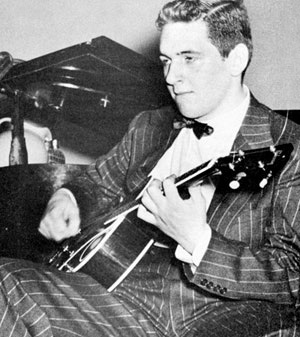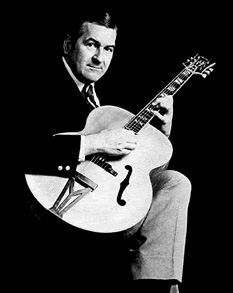
Biography
Marty Grosz is today's foremost jazz rhythm guitarist and chord soloist. He is virtually the only major jazz guitarist who doesn't use an amplifier. This makes him either the last remaining proponent of the acoustic guitar tradition in jazz or the lone harbinger of a new non-electric movement.
Marty sings, too. His vocals have become as much in demand at record sessions and jazz concerts as his driving guitar rhythm. They are delivered in styles ranging from barrelhouse abandon to whispered restraint, and are sometimes raucous, often mischievous, but almost always informed with a wry sense of the absurd. One of jazz music's great comedians (his spontaneous monologs are often hilarious), Marty Grosz is a brilliant acoustic guitarist whose chordal solos bring back the sound of Carl Kress and Dick McDonough of the 1930s, while his vocals are very much in the Fats Waller tradition.
Martin O. Grosz was born in Berlin, Germany on February 28, 1930. He has been a resident of the USA since the age of three and he began playing ukulele at the age of eight. A few years later he heard a record that highlighted guitarist Bernard Addison's shuffle-beat behind Roy Eldridge's trumpet: Out went the uke and in came the banjo and guitar.
While growing up in New York, Marty attended Columbia University, and in 1950, recorded his first record with a band that included the young pianist, Dick Wellstood, and the veteran New Orleans bassist, Pops Foster. Settled in Chicago (for nearly 20 years), Marty played with many of that town's jazz stars such as Albert Ammons, Floyd O'Brien, Art Hodes, and Jim Lannigan and recorded with Dave Remington, Art Hodes, and Albert Nicholas in the 1950s. He led sessions of his own in 1957 and 1959 for Riverside and Audio Fidelity; and tried his best to coax Jabbo Smith out of retirement (some of their rehearsals were later released on LP), but was pretty obscure until he joined Soprano Summit (1975-1979).
Marty returned to New York in 1975 to join Bob Wilber and Kenny Davern's Soprano Summit. There followed a round of touring and recording with Soprano Summit; Dick Wellstood's Friends of Fats; Yank Lawson and Bob Haggart; and the New York Jazz Repertory Orchestra directed by Dick Hyman, an orchestra with which Grosz played at the White House. In 1986 Grosz became a charter member of The Classic Jazz Quartet, along with Dick Wellstood, Joe Muranyi, Dick Sudhalter, and later headed the Orphan Newsboys, a superb quartet that also includes Peter Ecklund, Bobby Gordon, and bassist Greg Cohen. Marty Grosz, a unique personality, has recorded several delightful sets for Jazzology and Stomp Off.. Besides playing and singing with the group, Marty wrote most of its arrangements. He has appeared at guitar concerts with such players as Joe Pass, Herb Ellis, and Charlie Byrd. He enjoys playing guitar duets and often works in a duet context with a violinist or saxophonist.
Marty was the son of German Expressionist artist, George Grosz, and contributed his fond reminiscences in George Grosz: The Berlin Years, published in 1986. Sadly, Marty and his older brother Peter have been forced to pursue a lawsuit against the author, Serge Sabarsky, who was the onetime dealer for the art of George Grosz, who passed away shortly after returning to Berlin in 1959.
As a featured single Marty has made guest appearances on Public Radio's A Prairie Home Companion and Fresh Air with Terry Gross, and on NBC's Today Show. He was spotlighted at Carnegie Hall during the Cool Jazz Festivals and, more recently, at New York City's prestigious 92nd St. Y concerts and at the Vineyard Theater in Manhattan.
When he isn't on the road with his guitar, Marty and his wife like to spend afternoons on their patio in Piermont, New York, vodka in hand, watching the lazy Hudson drifting by.


[ SOURCES: All About Jazz, Scott Yanow, Riverwalk Jazz, New York Times ]
[ PHOTO CREDITS: Young Marty courtesy of Rutgers University - from The History of the Guitar in Jazz by Norman Mongran (p. 23) ]